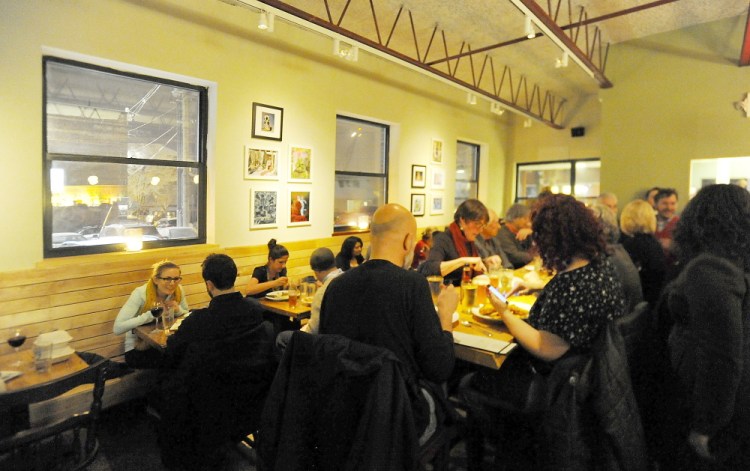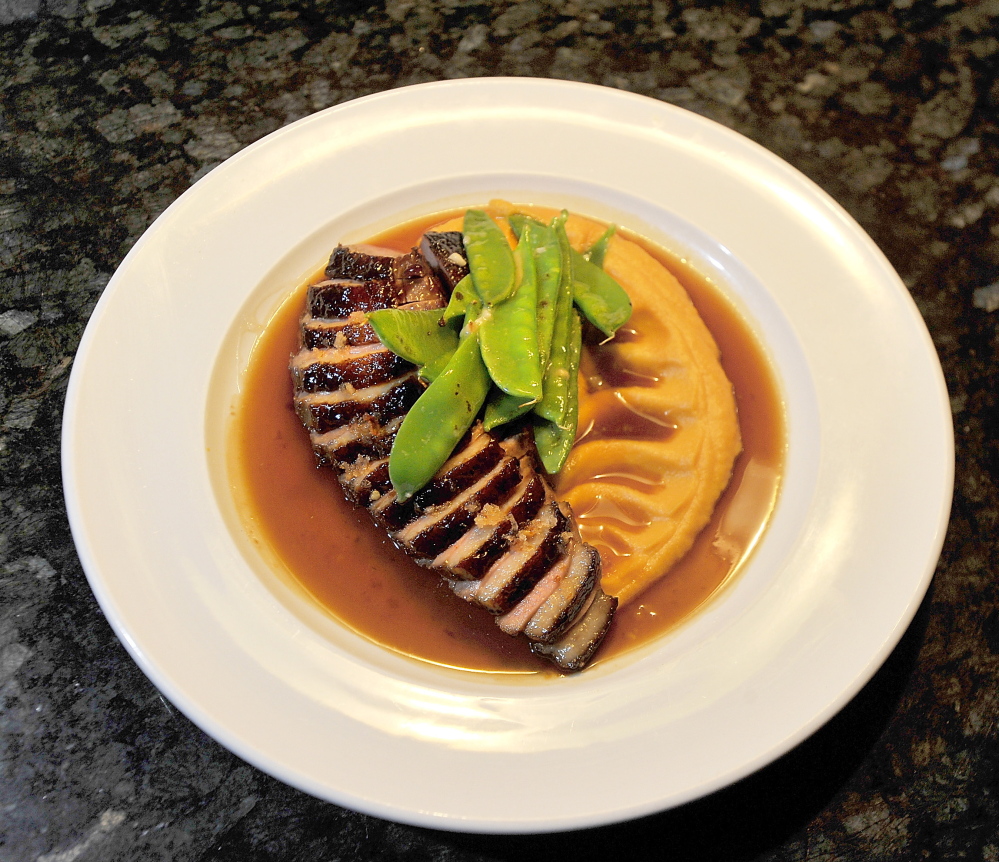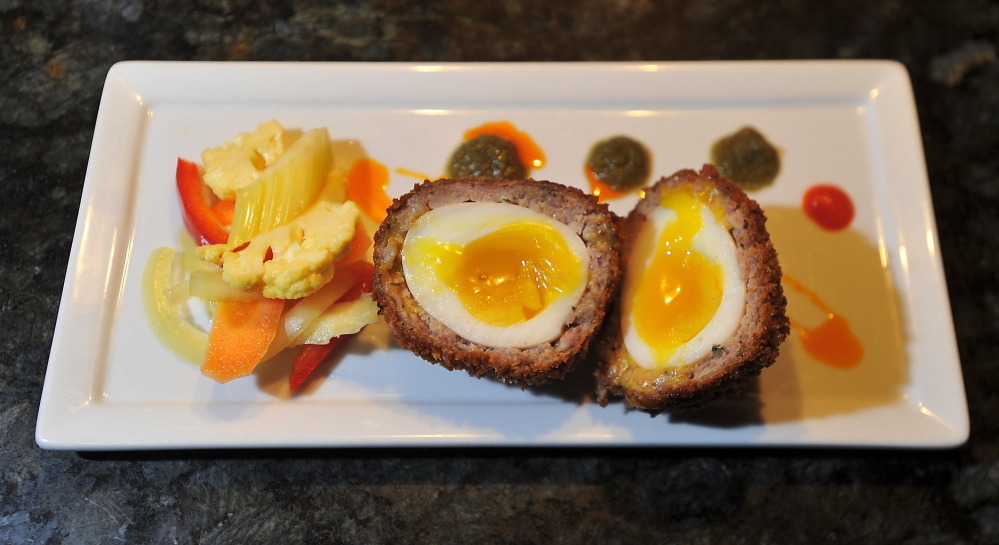There’s something unexpected inside the old post office building in Kittery Foreside – but you’ll have to work to find it. There’s no dramatic signage or valet parking out front, no spotlight or sandwich board propped on the sidewalk, just a small slice of wood inscribed with the words “THE black birch” (for mysterious reasons, an uppercase “the”) and placed, curiously, at ankle height near the front door. We missed the marker entirely and had to ask a pedestrian for directions.
The exterior of the 1950s-era building may be undistinguished, but the interior contains a neighborhood restaurant that’s sleek and surprising: There’s a bar with an artfully lighted niche displaying bottles of spirits dominating one side of the room. On the other side, diners fill an community table, and about 20 lower tables facing a banquette that looks like the bench in a snazzy Swedish sauna. The ceilings are high and coated with rough blown insulation. The floors are gleaming and made of polished terrazzo. The look is cool and quirky and emphatically casual, a lot like the menu that the pig-tailed young waitress drops off.
“We’ve all been to run-of-the-mill expensive and subdued restaurants,” says Ben Lord, who opened The Black Birch in 2011 with mixologist Gavin Beaudry and chef Jake Smith (today the three are co-owners), “but we wanted to create someplace here that was more accessible, even occasionally raucous…with comfort food that’s fun.”
That kind of food dominates the short menu: Scotch eggs and grilled cheese, Reubens on rye and beer-battered fish and chips. And like the restaurant building itself, the predictable dishes contain a few surprises.
Take the Scotch egg ($7), a pub staple that weighs in on the heavy side, but satisfies on a cold, snowy night. (Lord says that the menu at The Black Birch changes eight to 10 times each year to reflect seasonal favorites.) First, you slice through the ground sausage and take a taste. Lightly seasoned. Decent texture. Perfectly fine. Then you cut into the hard-boiled egg inside: It’s tender and fresh, and the vivid orange yolk looks as if it were Photoshopped. “We get the eggs from a friend who used to work with us but left to start his own farm nearby,” Lord explains. The sausage is local too, made by Jarrod Spangler, who opened Maine Meat butcher shop a few doors away last year. “We are shaped by our community,” Ben Lord says, “and the more we can buy locally or make ourselves the better our food will be.”
The kitchen corns the beef that takes center stage in the Reuben on rye ($14), a generous sandwich big enough to raise your eyebrows (and your cholesterol). The corning process takes two weeks, and the house-made brine produces reasonably flavorful slices, but the real surprise are the pickles. Put up each year by the kitchen, they’re crunchy, sour and startlingly spicy, seemingly unrelated to the usually limp supermarket spears. I’d order this Reuben just for the chance to polish off the pickles – and the warm potato salad offered alongside.
The dressing on the wilted kale salad ($10) was another eye opener – clean and bright lip-smackingly tart. (Perhaps because of the acid in this dressing, the kale leaves tasted tender, not tough.) A handful of pecans, roasted potatoes and crumbles of salty bacon made the salad more of a meal than a starter.
Appetite whetted, I dug into a bowl of pappardelle with Bolognese sauce ($15), a classic that should have been satisfying but was merely filling. It wasn’t the pasta (though Lord admits that the kitchen doesn’t always have time to make the noodles in house); it was the sauce, a bland combination of beef and tomatoes that lacked enough seasoning or concentrated flavor to make any impression. I wouldn’t order it again.
Instead, I’d move further down the menu and try the Lacquered Duck ($21), the very best surprise from the kitchen at The Black Birch. The duck is out of this world – tender slices of rosy meat, each with a crisp tiara of fat, flavored with ginger and garlic and served with a hoisin-infused chili sauce. The dark brown sauce is sweet, rich and thick but not cloying. If they’d brought any bread to our table, I would have mopped up every drop. I had to use a spoon instead.
One more surprise was in store at the Black Birch the night we visited, a crème brûlée ($7) with a bitter bite that the waitress explained came from coffee. The custard itself was fragile and pale, the sugary glaze on top sweet and charred, each black shard delivering the distinctive taste and pungent aroma of strong coffee. It was a final, pleasing (and caffeinated) surprise from the staff in the kitchen.
The Black Birch has its limits. The menu is short and some of the choices are merely good. Also, depending on the night you visit, the noise level in the small space can grow uncomfortably loud for mature audiences: The bar has 24 draft lines and is building a busy cocktail program that draws an enthusiastic, young crowd. But it’s the unexpected that satisfies here.
Surprises await behind those unmarked doors, and it’s worth driving around the block a few times – or asking for directions – in order to discover them.
James H. Schwartz has covered food, travel and architecture for regional and national publications for more than 30 years. Long a commuter between Portland and Washington, D.C., he retired from his job as vice president at the National Trust for Historic Preservation in 2013 and relocated to Maine.
Send questions/comments to the editors.





Success. Please wait for the page to reload. If the page does not reload within 5 seconds, please refresh the page.
Enter your email and password to access comments.
Hi, to comment on stories you must . This profile is in addition to your subscription and website login.
Already have a commenting profile? .
Invalid username/password.
Please check your email to confirm and complete your registration.
Only subscribers are eligible to post comments. Please subscribe or login first for digital access. Here’s why.
Use the form below to reset your password. When you've submitted your account email, we will send an email with a reset code.